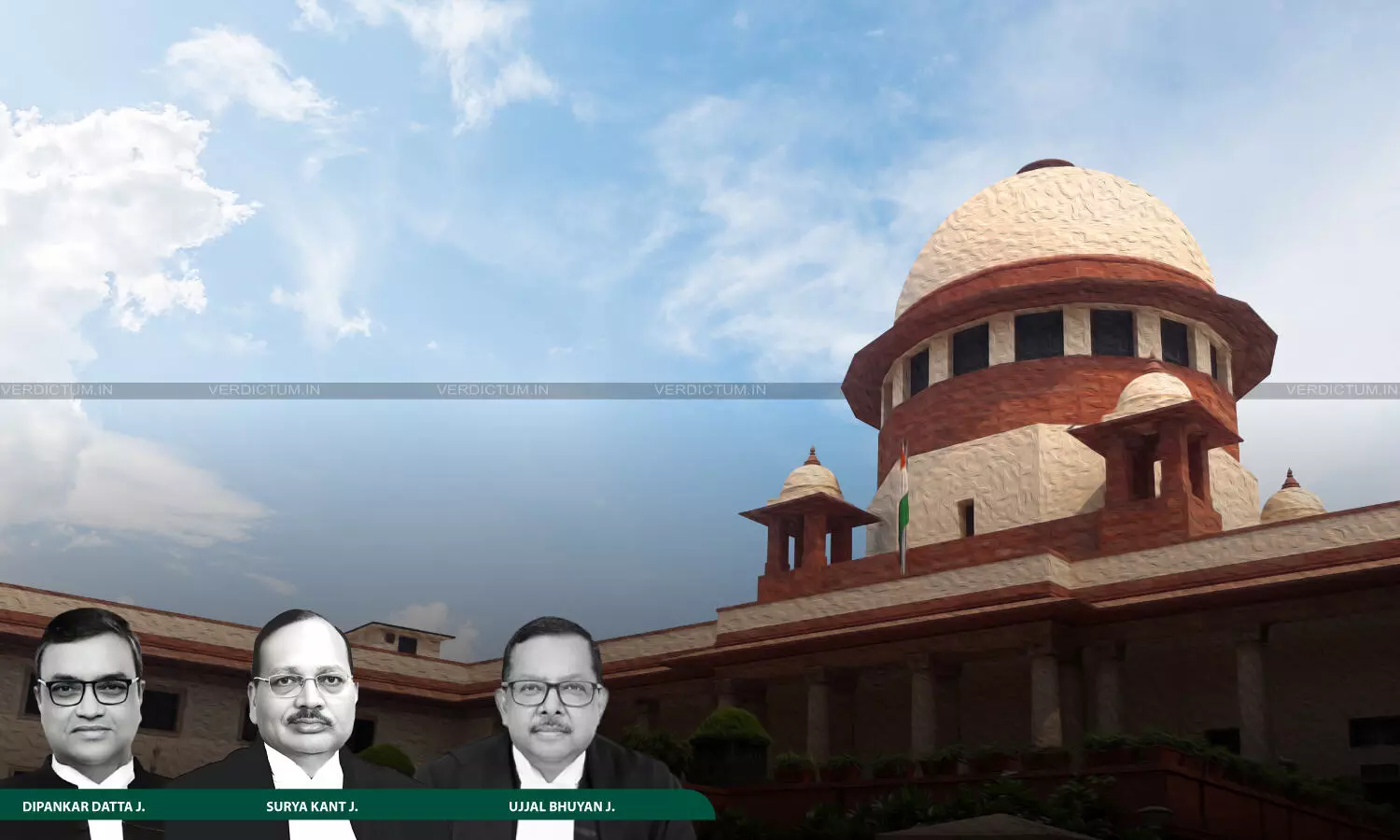
Justice Surya Kant, Justice Dipankar Datta, Justice Ujjal Bhuyan, Supreme Court
Loosely Drafted Writ Petition Under Article 32 Not To Be Entertained In Absence Of Requisite Pleadings: Supreme Court
 |
|The Supreme Court said that merely because a litigant barely pleads in his Writ Petition before the Court that any of his Fundamental Rights has been breached, it would not entitle him to maintain a Petition under Article 32 of the Constitution.
The Supreme Court, in its recent Judgment, observed that a loosely drafted Writ Petition under Article 32 of the Constitution ought not to be entertained in the absence of the requisite pleadings.
The Court observed thus in a Civil Appeal filed against the Judgment of the Allahabad High Court, which allowed a Writ Petition.
The three-Judge Bench of Justice Surya Kant, Justice Dipankar Datta, and Justice Ujjal Bhuyan remarked, “If the principles deducible from the authorities referred to above are of any guidance and help, a loosely drafted writ petition under Article 32 ought not to be entertained in the absence of the requisite pleadings. Even where violation of a statutory right is sought to be camouflaged as violation of a Fundamental Right, or where a statutory right is found to have been predominantly violated with only an incidental infringement of a Fundamental Right, this Court may, in the judicious exercise of its discretion, refuse to entertain the writ petition while safeguarding the liberty of the suitor to pursue his writ remedy before the High Court under Article 226 of the Constitution.”
The Bench said that merely because a litigant barely pleads in his Writ Petition before the Court that any of his Fundamental Rights has been breached, it would not entitle him to maintain a Petition under Article 32 of the Constitution.
“What is additionally necessary for him to plead is the nature of breach of Fundamental Right, actual or apprehended, and the (likely) consequence thereof”, it added.
Court’s Observations
The Supreme Court in view of the facts and circumstances of the case, noted, “Writ jurisdiction in India, as is well known, emanates from two articles of the Constitution – Articles 32 and 226. The latter pertains to writ jurisdiction exercisable by the various High Courts in the country while the former confers jurisdiction on the Supreme Court to issue writs/orders/directions for enforcement of the Fundamental Rights, guaranteed by the Constitution. Since the High Courts are empowered under the Constitution to enforce legal rights, apart from Fundamental Rights, the power conferred under Article 226 is considered to be more expansive compared to the power under Article 32.”
The Court further observed that for a Writ Petition under Article 32 of the Constitution to be entertained, the Petitioner has to run a case establishing prima facie violation or imminent threat of violation of any Fundamental Right.
“Furthermore, the right to seek an effective legal remedy for an infringed right is part of the right to life enshrined under Article 21 of the Constitution. … for completeness of decision, we are ad idem with the contention that a writ petition cannot lie against a judicial order”, it said.
The Court also reiterated that a party to the proceedings affected by a Judgment/Order may Appeal as of right within the prescribed period of limitation, if such a right is created by a statute, however, insofar as a stranger, i.e., a non-party to the proceedings is concerned, if an Appeal from the Judgment/Order is allowed, he too can Appeal provided a leave/permission is granted by the Appellate Court.
“Law is well-settled that much is not required to obtain leave/permission. If a stranger, dissatisfied with a judgment/order, can make out even a prima facie case that he, being bound by such judgment/order, is aggrieved by it or prejudicially affected by it, there could arise little reason for declining leave/permission”, it added.
Moreover, the Court elucidated that no act of Court should harm a party being the foremost principle in the mind of any Court, it would be a travesty of justice if such Court, feeling bound by the shackles of technicalities, were to decline interference to set things right despite arriving at a definitive conclusion of being tricked by fraud; and, it is a fallacy to urge such a contention before the Supreme Court, which has vast and pervasive powers to remedy any wrong that might have occasioned to a litigant owing to sharp and fraudulent practices of another litigant, more particularly in a case of proven fraud.
Accordingly, the Apex Court allowed the Appeal, set aside the High Court’s Judgment, and issued necessary directions.
Cause Title- Vishnu Vardhan @ Vishnu Pradhan v. The State of Uttar Pradesh & Ors. (Neutral Citation: 2025 INSC 884)
Appearance:
Solicitor General Tushar Mehta, Senior AAG Garima Prashad, Senior Advocates Dushyant Dave, Niranjan Reddy, Nikhil Goel, Shyam Divan, Devadatt Kamath, Pinaki Mishra, Shoaib Alam, AORs Aniruddha Deshmukh, Vipin Nair, Shashank Shekhar Singh, Soayib Qureshi, Ashutosh Ghade, Abhinav Agrawal, Shalini Kaul, Advocates Sughosh Subramanyam, Udayaditya Banerjee, Sanskruti Samal, Mohd Aman Alam, M.B. Ramya, Aditya Narendranath, Madhavi Yadav, Yashvardhan Singh, Abhinav Singh, Sameer Jain, Suvigya Awasthy, Vivek Joshi, Deepesh Raj, Ruby Singh Ahuja, Pravin Bahadur, Amit, Kanika Gomber, Akanksha Thapa, Uzma Sheikh, Tribhuvan Narain Singh, and Chaman Choudhary.